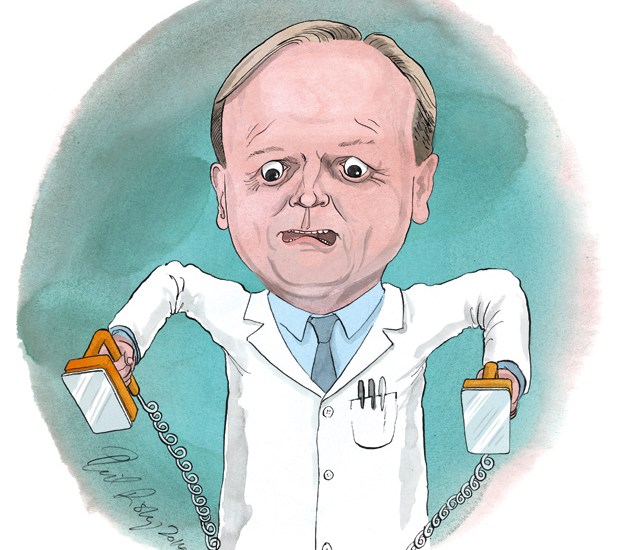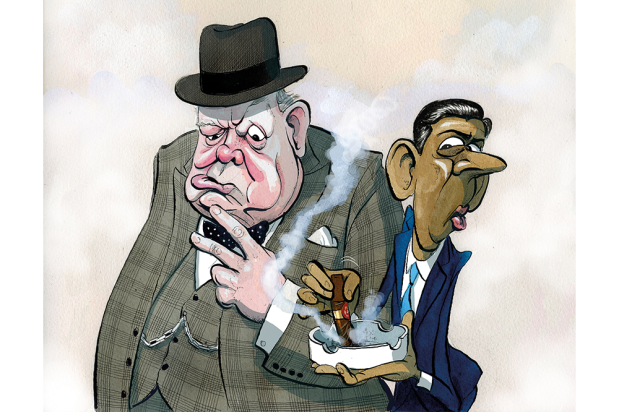In a valedictory interview, Sir David Nicholson was quite frank about the state of the health service that he has run for the last eight years. ‘In its current form,’ he declared, ‘the NHS is unsustainable.’
It is hard to imagine Simon Stevens, who takes over as NHS England chief executive this week, having to say that when he leaves. His friends know him as an experienced reformer, a policy expert and a radical. His CV causes some suspicion in Tory circles — he is a former adviser to Tony Blair (I’m also guilty in that respect) and was a co-author of the last Labour government’s health reforms — but that is precisely why he will be so valuable to David Cameron now.
It is a measure of the scale of the task facing Stevens that politicians and health service officials alike are all already shivering with anxiety at the thought of next winter. They fear a flu epidemic, an NHS system unable to cope — and a fiasco which may determine the result of the next election.
This is familiar territory for Stevens. It was after a similar flu outbreak that he co-wrote the NHS plan presented in 2000 by Alan Milburn — a market-orientated revolution which redefined the NHS as a system for paying for healthcare, but not necessarily providing it. Does that put him on the left, or the right? The answer is neither: he left No. 10 a decade ago and has had no political affiliation since he moved to the US to work for the American company UnitedHealth Group in 2007.
Many will ask if he will find it hard to work for Jeremy Hunt, given his closeness to Alan Milburn and Tony Blair. One answer, of course, is that he doesn’t work for Hunt — he works for the independent board of NHS England.
This is something the public often fails to understand: between them, successive Labour and Tory governments have put the NHS outside day-to-day political control. If a bedpan is dropped in Tredegar, to adapt Nye Bevan’s famous remark, it will be Stevens not Hunt who hears it reverberating.
Before Stevens agreed to take on the NHS he took counsel from his colleagues. One told him: ‘There are 100 reasons not to take the job, and only one reason to take it — your country needs you.’ And so Stevens cheerfully accepted the inevitable pay cut for moving from the American private sector to the British public sector; indeed, he has taken a voluntary 10 per cent cut on the salary of his predecessor.
Simon Stevens was born on a Birmingham council estate 47 years ago. His father was a Baptist minister and he went to the local comprehensive and then on to Balliol. His glittering undergraduate career at Oxford was crowned by becoming president of the Union. Then, after a brief spell working in Guyana, he joined the NHS management trainee scheme. His first job was in Consett, County Durham, so he has no end of front-line experience.
Stevens set out his vision for the NHS in an essay for a pamphlet published by the think-tank Reform. The current management fad for running the entire NHS as if it were ‘one big hospital’ is doomed, he says. To avoid a crisis, the NHS needs ‘political stewardship, managerial execution, clinical engagement, and public communication’.
He is scathing about the way that almost all NHS reorganisations focus on ‘rearranging the administrative deckchairs’ rather than transforming patient care. As he puts it: ‘How can a quarter of NHS trusts get away with having their “value for money” accounts qualified by their auditors? How can a fifth of hospitals treat their older patients without dignity or compassion? And how is it that a single hospital in mid-Staffordshire could have been responsible for killing its patients at a level equivalent to two or more Lockerbie air crashes, yet apparently no one noticed or did anything?’
Stevens’s passion is transparency. He wants patients to have access to the same knowledge as their doctors. At UnitedHealth, he developed a system for ranking 250,000 doctors against national standards of care, and then ranking them again on value for money. This meant, in effect, listing the best doctors by price. Such transparency makes NHS bureaucrats recoil in horror — but it works. This system, applied to organ transplants, has led to a 5 per cent improvement in outcomes — and halved costs. As he puts it: a good health system requires transparency, the sharing of data and empowered patients.
This agenda — better outcomes at half the price — has an obvious appeal for an NHS operating against a backdrop of austerity. It goes hand in hand with moving services out of hospitals and into communities.
As Health Secretary, Jeremy Hunt has positioned himself as an NHS reformer, a champion of patients who is unafraid to challenge the system. It’s a worthy endeavour, but one for which he’ll need serious support. If he is serious about saving the NHS, then he will find the perfect partner in Simon Stevens.
Got something to add? Join the discussion and comment below.
Get 10 issues for just $10
Subscribe to The Spectator Australia today for the next 10 magazine issues, plus full online access, for just $10.
John McTernan was Tony Blair’s political secretary from 2005 to 2007, and Julia Gillard’s director of communications from 2011 to 2013.
You might disagree with half of it, but you’ll enjoy reading all of it. Try your first month for free, then just $2 a week for the remainder of your first year.














Comments
Don't miss out
Join the conversation with other Spectator Australia readers. Subscribe to leave a comment.
SUBSCRIBEAlready a subscriber? Log in